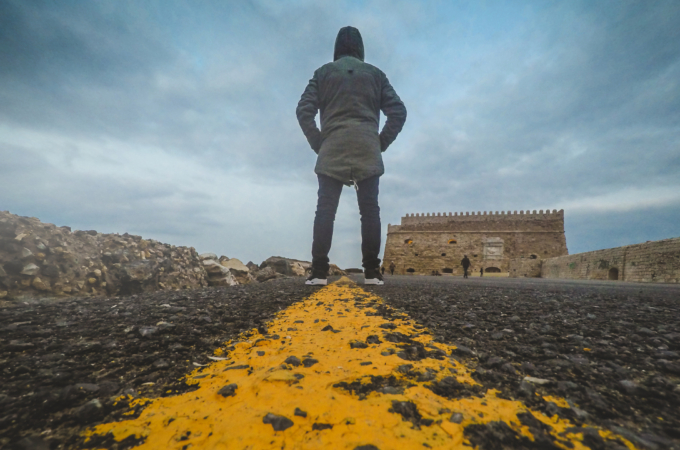My husband Will and I recently went to see the musical Hadestown, based on the Greek myth of Orpheus and Eurydice. Orpheus, a talented musician, and Eurydice fall in love, but Eurydice soon dies from a snakebite. Orpheus travels to the Underworld and convinces Hades, the ruler of the Underworld, to let Eurydice return to the living to be with him. Hades agrees, but with one condition: as Orpheus makes the journey back to the living and Eurydice follows behind him, he must not look back at her– he must trust that she is there.
During most of the journey back, Orpheus hears Eurydice’s footsteps behind him, and is able to quell his urge to look back. But just as Orpheus sees the sun before they both fully arrive, he turns to share his joy with Eurydice too soon– and Eurydice is tragically returned back to the Underworld.
Looking Backward
If a warning to not look back sounds familiar, it’s because there is someone in the Bible who also looked backwards with tragic consequences: Lot’s wife.
When morning dawned, the angels urged Lot, saying, “Get up, take your wife and your two daughters who are here, or else you will be consumed in the punishment of the city.” But he lingered; so the men seized him and his wife and his two daughters by the hand, the Lord being merciful to him, and they brought him out and left him outside the city. When they had brought them outside, they said, “Flee for your life; do not look back or stop anywhere in the Plain; flee to the hills, or else you will be consumed.”
Then the Lord rained on Sodom and Gomorrah sulfur and fire from the Lord out of heaven; and he overthrew those cities, and all the Plain, and all the inhabitants of the cities, and what grew on the ground. But Lot’s wife, behind him, looked back, and she became a pillar of salt.
Genesis 19:15-17, 24-26
Both Orpheus and Lot’s wife were warned not to look back, but they did anyway. For Orpheus, it meant losing his wife forever. For Lot’s wife, it meant losing her own life.
Obviously, we aren’t supposed to deduce from these stories that we should never look backwards. Sometimes, we have to look behind us to confirm our physical safety, or to make sure our children or loved ones are safe behind us.
When these stories are read metaphorically, though, we see that looking backward can often be detrimental to our lives. Dealing with our past for some amount of time can help us break unhealthy behavior and heal from previous traumas. But when we continue to live in the past, we are unable to fully live in the present and fulfill our God-given callings in the future.
Jesus said to him, “No one who puts a hand to the plow and looks back is fit for the kingdom of God.”
Luke 9:62
Being stuck in our past keeps us from living the abundant life Jesus wants for us (John 10:10). We will not be able to make Christian minimalism changes to simplify and focus on what matters most if we are too attached to our past ways of living and thinking. We were not made to constantly look behind us, never seeing what’s happening now or in the future. We were made to look forward.
Looking Forward
In contrast to Lot’s wife, Paul writes about looking forward:
Not that I have already obtained [resurrection] or have already reached the goal; but I press on to make it my own, because Christ Jesus has made me his own. Beloved, I do not consider that I have made it my own; but this one thing I do: forgetting what lies behind and straining forward to what lies ahead, I press on toward the goal for the prize of the heavenly call of God in Christ Jesus.
Philippians 3:12-14
For Paul, looking forward is what is most important– looking towards how he can be more of who God is calling him to be, rather than dwelling in how he lived previously.
Paul is ready for change– ready to jump in and live a life changed by Jesus’ teachings and saving love. Too often we are scared to look forward, even if change will be beneficial for us– because looking backwards feels familiar, and looking forwards is uncertain.
Yet God invites us to look forward. With God’s help, we can pare down our lives and focus on what’s most important. We can prioritize loving and serving God and others. We can live into our identities as beloved children of God, ready and able to share Jesus’ love with the world.
As God tells us through the Prophet Isaiah:
Do not remember the former things,
Isaiah 43:18-19
or consider the things of old.
I am about to do a new thing;
now it springs forth, do you not perceive it?
I will make a way in the wilderness
and rivers in the desert.
God is here to help you overcome your fear of moving forward. Rather than living in the past, let’s look forward to our new, God-given future by shedding habits and ways of thinking that have not been serving us– so we can fulfill God’s calling for us.
Did you like this post? Check out the Christian Minimalism book!


1 Comment
Succor
May 9, 2022 - 10:02 amAmen! Verily true. Paul is “ready for change- ready to jump in” to kickstart– all for God’s glory!
(No buts, no ifs, no reservation.)
Luke 9:62. John 10:10; All verses cited– Encouraging, Enlightening, Admonishing, Edifying!
TO GOD BE THE GLORY! 🤗😊